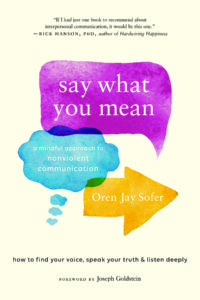A Q&A with Oren Jay Sofer, IMS Teacher and Author of Say What You Mean
By John Spalding
In his forthcoming book, Say What You Mean, IMS teacher Oren Jay Sofer draws on three streams of practice—mindfulness, somatics and Nonviolent Communication—to offer practical exercises that develop healthy and effective ways of communicating, creating more connection and understanding in our relationships. Recently, we sat down with Oren to discuss his book and the challenge of applying its insights at a time when our conflicts and differences seem greater than ever.
What motivated you to write Say What You Mean?
I think our world needs these skills now more than ever. With the internet and social media, we’re all so connected yet real dialogue is almost completely absent from the public discourse. I think we need to re-learn how to listen and talk to one another. Family gatherings turn into political feuds, and so much of mainstream journalism has become limited to espousing the views of one side or another. If we are to meet the immense challenges we’re facing on our planet and our society, we need to be able to work together—and communication is the key to that.
Many have an idea about what mindfulness is. What is “mindful communication”?
Mindful communication is creating understanding through awareness. We can apply both our intention and attention to the flow of connection and information in a relationship, and use mindfulness to create the conditions for mutual understanding to arise. So it’s a process of first learning to recognize what those conditions are, and then training our hearts and minds to support them more consistently.
I break the process down into three main steps. First, we train ourselves to lead with presence—which is rooted in basic mindfulness practice, but with a strong emphasis on embodiment, relational awareness, and specifically awareness during the flow of thinking, speaking and listening. Second, we train in an intention to come from curiosity and care. This too is an extension of mindfulness practice, learning to becoming conscious of what’s driving our speech and our actions, and steering in more wholesome, helpful directions.
The last step is training our attention—to focus on what matters. Here, we apply mindfulness to specific aspects of our experience and learn how focusing on different perceptions can be more or less useful to create understanding. For example, attending to perceptions of right and wrong, or should and shouldn’t, lock us in conflict and defensiveness. When we can place our attention on specific observations, emotions, and the underlying needs or values we hold, it creates more space for hearing one another.
Conversations often go awry when strong emotions arise. How can we best work with difficult emotions, both our own and the other person’s?
This is such a huge area of practice. Again, the foundation is mindfulness. We need to develop the capacity not only to be aware of our emotions but also to tolerate the discomfort of strong, unpleasant emotions. For meditators, we train in this everyday—sitting with knee pain, restlessness, or boredom. If we’re really paying attention, we learn how those moments of patience, tolerance, energy, and letting go apply to the flow of our everyday life and interactions.
But we also need wisdom. We need to understand where our emotions come from, to recognize the meaning they often carry. If there’s emotion, something matters. Emotions are deeply rooted, biological signals that point to something that matters for us. When we get the information underneath an emotion—what we’re valuing, wanting or needing—the intensity of the signal can settle and we can go about attending to the situation. That might mean working internally with our relationship to a specific need or desire, or engaging external to explore the possibility of meeting that need with another.
In the book, you quote an intriguing saying—“the biggest problem with communication is the illusion that it has taken place.” Can you talk about that?
 Yes—I love that saying. (It’s attributed to George Bernard Shaw, though that’s in question). This points to a fundamental truth: communication is about sending and receiving messages. However, we often don’t check if message sent equals message received. We can have a whole conversation without ever really confirming that we’re understanding one another. There’s a certain amount of validation that happens nonverbally, through facial expression, body language, and even intuition.
Yes—I love that saying. (It’s attributed to George Bernard Shaw, though that’s in question). This points to a fundamental truth: communication is about sending and receiving messages. However, we often don’t check if message sent equals message received. We can have a whole conversation without ever really confirming that we’re understanding one another. There’s a certain amount of validation that happens nonverbally, through facial expression, body language, and even intuition.
So much difficulty can arise from assuming that we’ve understood one another, only to find out later that we were mistaken! Instead, we can learn to build understanding step by step in a conversation—especially in challenging moments—by checking that we’re on the same page and confirming we’re really hearing one another. When we start to get a feel for this it can be quite satisfying.
You make a strong case for why it’s important to approach conversations with the intention of curiosity and care. What if the person seems to be trying to provoke us or make things difficult?
Then it’s all the more important to be firmly rooted in a wholesome, skillful intention. When that kind of energy is present, things can get explosive quickly if we’re not able to bring a cool, clear, and steady intention to the interaction.
I think it’s important to also be wary of our assumptions. Even if the person is trying to get a rise out of us, if we’re connected to curiosity and care we can see more deeply into their heart. We may sense their pain, and understand their behavior as a tragic attempt to find relief, understanding or empathy for how they feel. We may intuit a feeling of helplessness underneath the aggression, and a desire for autonomy, agency, or even deeper knowing that they matter. Seeing through the eyes of compassion can allow us to connect with the humanity in another in spite of unskillful or harmful behavior. Our response will then be much more likely to deescalate the situation and cool the flames.
We now live in a “post-truth” world full of “alternative facts.” How can we have a constructive conversation with those with whom we can’t even agree on basic observations?
That’s the question for our time, isn’t it? I think there are a few important points here. One is to see if we can find basic agreements on how we want to have a conversation. We may disagree on the facts, but if we can establish a framework of mutual respect, listening, and kindness, we’ve already changed the dialogue.
That isn’t always possible at the outset, and we may need to work to embody those qualities in ourselves until we’ve engendered enough trust and personal connection to create that kind of space. So the second point is seeing if we can listen beneath the information to what really matters. Regardless of which set of data you’re looking at, where it’s coming from or why you’ve chosen it, what’s important to you? Even if we can’t agree on the data, we can find common ground in our basic human values. Do we want a society that provides clean drinking water, access to food, education, meaningful work and medicine? I believe that our conflicts and differences arise in how to get there.
The last avenue is the possibility of having an honest conversation about our value for truthfulness, and genuinely exploring the validity of our data together. Right now, there’s spin on both sides. It’s hard to find objective, balanced reporting. What would it be like to own up to that and really explore creating shared criteria to evaluate data?
What do you most hope people will take from reading your book?
First and foremost, communication is a learnable skill. We each have the capacity to communicate better. Second, conflict can be a source of creativity, discovery, and even intimacy rather than pain and disconnection. And last, that it’s not separate from our contemplative practice. Communication and relationship can be the source of profound and transformative insight.



